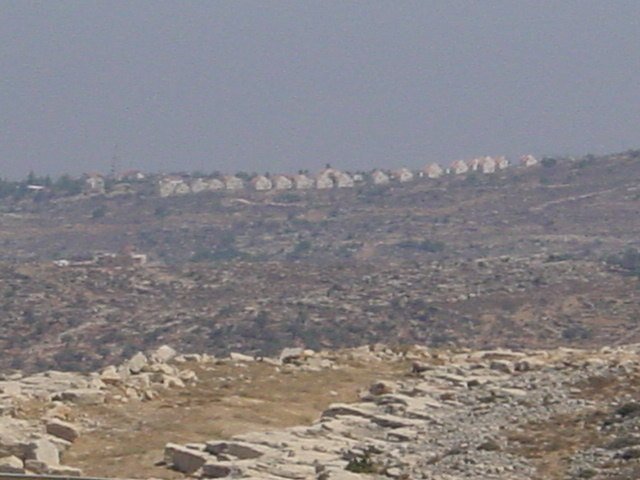July 17, 2001
The illegal Israeli settlement of Naha’ail sits on a nearby West Bank hill top.
This morning our view was nice and clear, meaning we could see the Israeli settlement Naha'ail that looms on a nearby hilltop. It's been there for the last nine years or so, built just prior to Oslo. It's also within the view from our classroom at the University - most settlements are built on hilltops, which makes them easier to defend. It also makes them a constant reminder to residents of Israel's thirty-four year occupation of this land.
Today being Tuesday, we had another guest lecturer for the summer students. Yusef Nassar is a native Birzeitian, but was raised in the States and speaks English without accent. He only learned to read Arabic as an adult - not an uncommon thing for dual-culture Americans.
Another day of colloquial Arabic classes at Birzeit.
With his American citizenship he returned to Birzeit as faculty in 1980. As his new employer was in occupied territory, he had to constantly renew his three-month tourist visa (no work visas were being issued). In 1982 a military edict went into effect such that every fifteen days he had to get permission from the military offices in Ramallah to work at Birzeit. By 1993 he received his Palestinian residence ID, but given the current situation he cannot leave - as far as Israel is concerned, his Palestinian identity overrides his American citizenship. The American Consulate told him it's none of their business - this is an internal Israeli issue.
None of this, however, was his topic - we asked him about it after the talk. His lecture was an overview of the economy over the past 52 years in the West Bank, including the current condition here in the West Bank. Since the outbreak of violence, it is estimated that the Palestinian economy is losing roughly $6 million each day - one-third of that in wages that people would be earning in Israel. Israeli border closures have cut that financial lifeline.
Even prior to this, though, the economy here has been totally reliant upon Israel. The Oslo process simply made it official. One example: it is now a requirement that all petrol must be purchased from an Israeli refinery in Haifa. The additional excise tax goes not to the Palestinian Authority, but into the personal bank accounts of Yasir Arafat and two others - roughly $30-40 million each month. There's little doubt that the P.A. has benefited from Oslo, while the Palestinian people have gained very little - if any.
We returned to chat with our next-door neighbor who spent yet another day without work.


